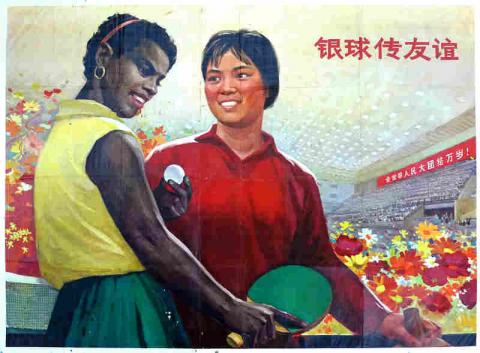
(Vera Fennell)
In her upcoming book, Reading Black through Red: Blackness as China’s Cold War-era Soft Power, Fennell argues that as questions of global hegemony increased during the Cold War era, the Chinese communist media sought to present a view of blackness that differed from the West's. In so doing, it allied itself with black internationalism. Sino-African friendship and its continuation in a non-exploitative, non-colonialist relationship was a priority, she says
“The Chinese cultivated relationships with countries like Zambia, communicating with the political leaders of the National Party,” says Fennell, associate professor of political science and global studies. “They were inviting them to visit China, giving them the full diplomatic treatment. They cultivated relationships with African leaders before the countries were even independent. In the People’s Daily, the newspaper of the Chinese Communist Party, the Chinese would talk about how they were supporting these people who are fighting against the West, fighting against colonial domination.”
Analyzing a 50-plus year span starting with the Cultural Revolution in 1966, she says the one area where the Maoist era dialogue on China’s relationship with Africa has not been erased or forgotten is in the media. This discourse has been revived in the Chinese foreign policy establishment and reported in the media as a political resource for contemporary purposes. Africa had a role in China’s great leap into a semi-market economy and its reform and opening to the non-socialist world. Chinese media narrated this as a continuation of an old friendship, not as something new. She adds that race poses a challenge to the communist party’ central committee, and education about the image of Africa and Africans in the diaspora, their histories, and their struggles is promoted. Current news reports about China’s relationship with various African states warn of a reestablishment of 19th century colonial relations. As during the Cold War, China recalls a brotherhood with African states under the banner of Third World solidarity.
Fennell, who is also a faculty member in Africana studies, says the Maoist era notion of analogizing the black and Chinese experiences offers the most promising opportunities for changing Chinese attitudes. Reading Black Through Red evolved from parallel research into posters produced by the party during the Cultural Revolution. The posters reinforce ideals of proletarian unity and a collective unity. At a time when China was developing relations with African nations, posters often reinforced messages of transforming the world through a common struggle against the West.
“At the time, the posters were an easy way to convey new ideas to people who were largely illiterate. There weren’t that many characters on them, but you easily got the idea. They are highly visual from a distance and it was a way to teach people a new political way to behave. They were showing people how to act in this period of developing new identities.”
